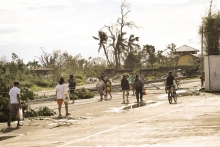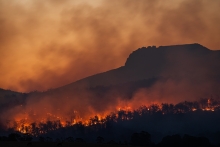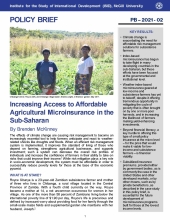Veterinarian and Ph.D. candidate (NRS) Vivian Arguelles Gonzalez weighs in on silvopastoralism, an alternative agricultural system that could address the environmental impacts of livestock, and provide farmers with social and economic benefits that include creating new jobs, developing new skills, reducing costs and improving their incomes.

February 4, 2022 | This paper presents an in-depth analysis of women earthquake survivors during and after the 2015 earthquake in Nepal by looking at women’s experience of evacuation, relief, and recovery. In particular, it examines how gender intersects with socio-economic factors such as citizenship, caste, ethnicity, income, debt, and location to shape women’s disaster experience.

In the summer of 2021, Max Bell School Master of Public Policy candidates Danielle Appavoo, Mariel Aramburu, Ricardo Chejfec, and Anil Wasif responded to a call to the academic community from Québec’s Minister of Finance, M. Eric Girard. The Minister was interested in proposals from universities and research groups, namely on (i) fiscal policy in Québec, (ii) the province’s economic potential and (iii) the fight against climate change.

November 24, 2021 | RN-WPS Youth Advisory Board member Muzna Dureid explains why Canada should modernize its immigration policy to respond to people displaced by climate change.

January 10, 2022 | "Nearly 5% of global greenhouse gas emissions can be traced to health care activities in developed countries," writes MPP alumna Henna Hundal. Read her full argument for the crucial importance of including the healthcare sector in decarbonization efforts.

November 3, 2021 | As the 26th UN Climate Change Conference takes place in Glasgow, Maryruth Belsey Priebe and Tevvi Bullock ask is there adequate attention to gender in urban-climate-conflict discussions, pledges, and policies? Their blog is evidence of why the gender-climate-security nexus is critical for countries to be better prepared to deal with climate change.
A multidisciplinary team of researchers, including McGill's Scott Weichenthal, an Associate Professor in the Department of Epidemiology, Biostatistics, and Occupational Health, has been awarded the Brockhouse Prize for Interdisciplinary Research in Science and Engineering from the Natural Sciences and Engineering Research Council of Canada (NSERC).

November 1, 2021 | Caroline Merner shares her insights on 2021 Glasgow Climate Conference (COP26).

The twenty-sixth session of the Conference of the Parties (COP 26) of the United Nations Framework Convention on Climate Change (UNFCCC) will be hosted by the United Kingdom, in partnership with Italy. The summit will bring parties together to accelerate action towards the goals of the Paris Agreement and the UNFCCC. More than 190 world leaders will participate, along with tens of thousands of negotiators, government representatives, businesses and citizens for twelve days of talks. (United Nations)

During his official visit to the Netherlands and the Global Center on Adaptation on October 29 2021, Prime Minister Justin Trudeau (seen here with Dr. Patrick Verkooijen, Chief Executive Officer, Global Center on Adaptation) examines the "State and Trends in Adaptation Report 2021: Africa", co-directed by ISID Professor of Practice Jamal Saghir. The full report can be found online.

October 21, 2021 | In this op-ed for Maclean's Max Bell School director Chris Ragan, Dale Beugin and Gord Lambert explain why ahead of COP26, Alberta needs to prepare for the inevitability of a low-carbon world.

In this new policy brief by Brenden McKinney, we learn that the effects of climate change are causing risk management to become an increasingly essential tool to help farmers anticipate and react to weather- related shocks like droughts and floods.

To fully grasp and plan for climate impacts under any scenario, researchers and policymakers must look well beyond the 2100 benchmark. Unless CO2 emissions drop significantly, global warming by 2500 will make the Amazon barren, the American Midwest tropical, and India too hot to live in, according to a team of international scientists.

August 23, 2021 | When voters went to the polls in the recent federal election, climate change was front of mind for many. For the first time, all major parties had credible plans to reduce greenhouse gas emissions. But how did the plans stack up to each other? Max Bell School director Chris Ragan weighs in on this episode of The Current.

September 12, 2021 | The 44th federal election campaign is over, and the Liberals have clung to their plurality of seats in the House of Commons, setting them up to form another minority government. Read about what they have promised to do to fight climate change during their new mandate.
